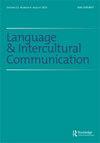英语是“大家共享的语言”,但它是“我的母语”:国际化高等教育中学生之间的语言意识形态和人际关系
IF 2.2
1区 文学
0 LANGUAGE & LINGUISTICS
引用次数: 0
摘要
摘要本文探讨了在高等教育国际化背景下,不同的语言意识形态——关于语言及其使用者的一系列常识性信念——在学生身份建构和协商中的作用。随着讲英语的学生越来越多样化,语言意识形态也被批判性地审视是否可能导致学生之间的不平等。我分析了芬兰一所大学国际英语教学硕士项目学生的两次焦点小组讨论。我运用批判性话语心理学来探究学生的谈话,以阐明语言意识形态与学生情境身份建构之间可能的交叉点,在学生身份协商的同时关注意识形态困境。研究结果表明,新兴和成熟的语言意识形态都可能与学生的身份建构和协商有关。也许,将学生的注意力转向每个学生的多语性以及学术语言的特定目的和特征,可能有助于学生之间包容性人际关系的话语可持续性。本文章由计算机程序翻译,如有差异,请以英文原文为准。
English is ‘the language everybody shares’ but it is ‘my native language’: language ideologies and interpersonal relationships among students in internationalizing higher education
ABSTRACT This paper examines the roles of different language ideologies—sets of common-sense beliefs about language and its speakers—in students’ identity construction and negotiation in the context of internationalizing higher education. Along with the increasing diversity of students as English speakers, language ideologies have been critically examined for potential contribution to inequalities among students. I analyze two focus group discussions of students from international English-medium instruction master’s programs at a Finnish university. I explore the students’ talk using critical discursive psychology to illuminate possible intersections between language ideologies and students’ situated identity construction, paying attention to ideological dilemmas alongside students’ identity negotiation. The findings indicate that both emerging and established language ideologies may become relevant to students’ identity construction and negotiation. Possibly, turning students’ attention towards the multilinguality of every student and the specific purposes and characteristics of academic language might contribute to the discursive sustainability of inclusive interpersonal relationships among students.
求助全文
通过发布文献求助,成功后即可免费获取论文全文。
去求助
来源期刊

Language and Intercultural Communication
Multiple-
CiteScore
3.00
自引率
47.40%
发文量
50
期刊介绍:
Language & Intercultural Communication promotes an interdisciplinary understanding of the interplay between language and intercultural communication. It therefore welcomes research into intercultural communication, particularly where it explores the importance of linguistic aspects; and research into language, especially the learning of foreign languages, where it explores the importance of intercultural perspectives. The journal is alert to the implications for education, especially higher education, and for language learning and teaching. It is also receptive to research on the frontiers between languages and cultures, and on the implications of linguistic and intercultural issues for the world of work.
 求助内容:
求助内容: 应助结果提醒方式:
应助结果提醒方式:


